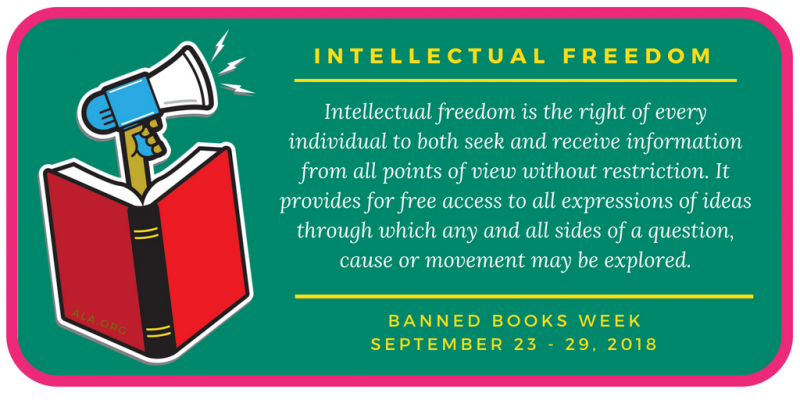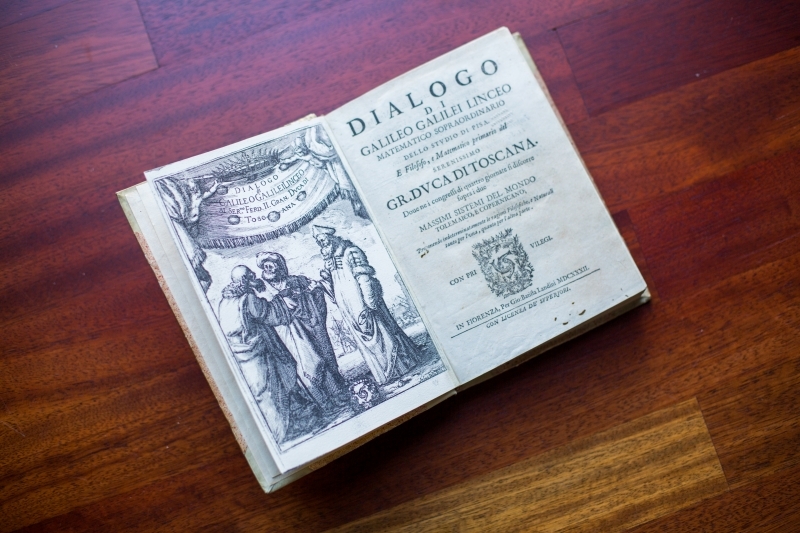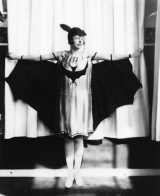
Banned Books Week: Galileo’s Dialogue
Banned Books Week: Galileo’s Dialogue

In celebration of Banned Books Week (9/23-9/29) I’m going to be discussing one of the most infamous challenges to scientific information in history: Galileo’s book Dialogue Concerning the Two Chief World Systems (Dialogo sopra i due massimi sistemi del mondo) and his eventual trial for heresy the Catholic Church.
First, a little information about Banned Books Week. Every year at the end of September, the American Library Association (ALA) cosponsors a week to celebrate intellectual freedom and the Freedom to Read, one of the ALA’s core principles. Initially launched in 1982, it’s a response to books being challenged (documented requests to remove books from libraries) in school and public libraries across the nation. While Galileo’s books may not be on the list this year, the list of challenged books includes well-renowned classics like The Catcher in the Rye, To Kill a Mockingbird, and Beloved, in addition to contemporary children’s and young adult literature.
For more about Banned Books week, check out: https://bannedbooksweek.org/about/

Now, forgive me for any misrepresentation of Galileo or the history of heliocentrism; I’m a librarian, not a historian or astronomer. But from what I understand, he was kind of a big deal? While heliocentrism (the understanding that earth and all our other planets revolve around the sun) was not discovered by Galileo, he does seem to get a lot of the credit for kicking up a fuss about it. Before heliocentrism was widely accepted, the belief was in the Ptolemaic system in which our lovely planet earth was the center of the solar system, also called geocentrism. Though there had been questions about the Ptolemaic model for centuries, Copernicus gets credit for being the European originator of heliocentrism with the publication of On the Revolutions of the Heavenly Spheres in 1543. Copernicus didn’t escape any criticism or challenges either; his book was challenged for years after it was published. Though other scientists contributed to the discussion around heliocentrism vs geocentrism (including Kepler and Brahe), it was Galileo who contributed new astronomical observations and published a book that would create a huge controversy.
First let us backtrack. Though his Dialogue is what created such a fuss, it’s his book, Sidereus Nuncius (Starry Messenger) from 1610 that started him on his heliocentric journey. Its publication spawned a slow moving controversy which finally resulted in the Catholic Church formally declaring heliocentrism to be heretical in 1616. Galileo was told to abstain from teaching or discussing his theories surrounding heliocentrism.
And yet in 1632, he published his Dialogue, an imagined conversation between three men, one pro-Copernican, one pro-Ptolemaic, and one neutral, about astronomy and science. In it he presents his arguments for a heliocentric system. Naturally, the Catholic Church objected and ordered Galileo to stand trial for heresy in 1633. He was eventually found guilty of believing in heliocentrism and required to formally reject those opinions. He was also sentenced to house arrest, where he remained for the rest of his life, until he died in 1642. And lastly, his book was officially banned as well as any past and future works. The Church did not remove the ban until 1822.
However, as we can easily discern from nearly 400 years in the future, banning Galileo’s book did not stop his ideas from spreading. As humans, we have benefitted from the dissemination of his book and his ideas. History has taught us that banning books and trying to suppress ideas is not something humanity can tolerate. Despite the Church’s efforts, a book once published is hard to remove from circulation, and we at the Niels Bohr Library & Archives are now proud to have a copy of Galileo’s Dialogue in the library as part of the newly acquired Wenner Collection.

Additional Reading
Drake, Stillman. Galileo at Work: His Scientific Biography.
Heilbron, John L. Galileo.
Kuhn, Thomas S. The Copernican Revolution: Planetary Astronomy in the Development of Western Thought.
Owen, Gingerich. The Book Nobody Read: Chasing the Revolutions of Nicolaus Copernicus.
Scotti, Dom Paschal. Galileo Revisited: The Galileo Affair in Context.
Sobel, Dava. Galileo's Daughter: A Historical Memoir of Science, Faith, and Love.
Wootton, David. Galileo: Watcher of the Skies.



Add new comment